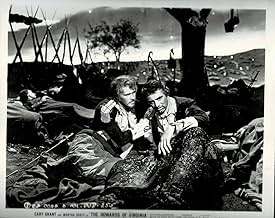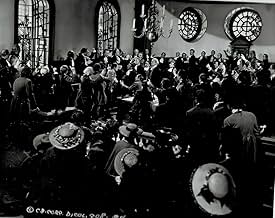NOTE IMDb
6,0/10
1,3 k
MA NOTE
Juste avant la Guerre d'indépendance américaine, l'aristocrate de Virginie, Jane Peyton épouse Matt Howard, simple fermier de campagne et géomètre, qui l'emmène dans sa plantation de Shenand... Tout lireJuste avant la Guerre d'indépendance américaine, l'aristocrate de Virginie, Jane Peyton épouse Matt Howard, simple fermier de campagne et géomètre, qui l'emmène dans sa plantation de Shenandoah Valley et plus tard prend part à la guerre.Juste avant la Guerre d'indépendance américaine, l'aristocrate de Virginie, Jane Peyton épouse Matt Howard, simple fermier de campagne et géomètre, qui l'emmène dans sa plantation de Shenandoah Valley et plus tard prend part à la guerre.
- Réalisation
- Scénario
- Casting principal
- Nommé pour 2 Oscars
- 3 victoires et 2 nominations au total
Cedric Hardwicke
- Fleetwood Peyton
- (as Sir Cedric Hardwicke)
Elisabeth Risdon
- Aunt Clarissa
- (as Elizabeth Risdon)
Tom Drake
- James Howard at 16
- (as Richard Alden)
Avis à la une
Despite rather mediocre reviews here on IMDb and in Leonard Maltin's guide, I really liked this movie. Unlike the few other American Revolution films Hollywood has made, this one was both interesting and did an excellent job in conveying WHY the Colonists were rebelling and didn't paint the British as total buffoons or Nazis (like in THE PATRIOT). Plus, the main character's father-in-law is a loyalist, so the real tensions that existed within families was given decent treatment. As an American History teacher, I must point out that despite coming from Hollywood in 1940, the realism in spirit is quite surprising and I could recommend this to kids, as they'd learn a lot.
It was odd to see Cary Grant as a bit of a rag-tag outdoorsman, but he carried it off better than I'd expected. Plus, his British accent really wouldn't have been out of place in the Colonies at that time.
Another big plus for the film was the relationship between Grant and his sons. Yes, it's a bit manipulative, but I really liked the way the writers dealt with this relationship in the movie. All in all, an excellent film.
It was odd to see Cary Grant as a bit of a rag-tag outdoorsman, but he carried it off better than I'd expected. Plus, his British accent really wouldn't have been out of place in the Colonies at that time.
Another big plus for the film was the relationship between Grant and his sons. Yes, it's a bit manipulative, but I really liked the way the writers dealt with this relationship in the movie. All in all, an excellent film.
I love the premise of this story about the founding of the U.S. but was disappointed in the acting. I am a big Cary Grant fan and have seen many of his films but this is a terrible performance, unlike any of his other films. No wonder he refused to do any more period pieces after the failure of this movie. However, it must be said that the director shares the blame and should have done a better job of directing Mr. Grant in this movie. His acting was over the top- too loud, too brash, a caricature of backwoods men of the late 1700s. His leading lady also did her share of overacting but nothing to compare to Mr. Grant. Overall, it is worth watching to get a sense of the events leading up to the Revolutionary War and the war itself and to see Mr. Grant in a role uncharacteristic of his usual fine acting.
I was a bit surprised to see so many other reviewers panning this film, since I had seen it once before and thought it was quite good. I watched it again, and I still believe it's a far better-than-average costume drama.
Several people thought Cary Grant was miscast, and even criticized his British accent. Well, what accent do you think a British citizen from the 1760s WOULD have? His character was a "low-born" British colonist, for crying out loud! I thought he did well, definitely playing against type, and I thought his actual British origins, hardly high-born, made him an excellent choice for the part. His character's progression over time, in this film, was believable and, I thought, well done. I suspect it parallels, in some ways, Grant's life changes from humble British kid to acclaimed Hollywood star.
The film itself, with its use of the colonial Williamsburg settings and attention to detail about frontier life, was refreshing, as of course was the excellent casting overall. I also thought the very realistic historical treatment was commendable, laying out clearly many of the controversies and issues facing the colonies during these times. I'd recommend it for kids, especially, since what they get for American history class about this period of time is truly awful -- what little there is.
I'd give it a solid 8, easily.
Several people thought Cary Grant was miscast, and even criticized his British accent. Well, what accent do you think a British citizen from the 1760s WOULD have? His character was a "low-born" British colonist, for crying out loud! I thought he did well, definitely playing against type, and I thought his actual British origins, hardly high-born, made him an excellent choice for the part. His character's progression over time, in this film, was believable and, I thought, well done. I suspect it parallels, in some ways, Grant's life changes from humble British kid to acclaimed Hollywood star.
The film itself, with its use of the colonial Williamsburg settings and attention to detail about frontier life, was refreshing, as of course was the excellent casting overall. I also thought the very realistic historical treatment was commendable, laying out clearly many of the controversies and issues facing the colonies during these times. I'd recommend it for kids, especially, since what they get for American history class about this period of time is truly awful -- what little there is.
I'd give it a solid 8, easily.
This was an unbelievably annoying performance by Grant. The script writing and direction were no better.
Simpler than it first appears. This movie tries to be an epic about a frontier man transformed into a civic and military leader - but it doesn't try that hard. Cary Grant doesn't look like he knows quite how to play this guy, and I don't blame him. The material isn't wonderful, although it's a nice story. The wrong elements of the plot are emphasized, and the character of Matthew Howard is less a complicated man than a simple cypher.
It's not a bad movie by any means, but it looks like it's trying desperately to copy "A Tale of Two Cities" and "Gone with the Wind" at the same time. It just doesn't have the legs for either one. I give this movie a 6 for Cary's personal magnetism, even in a stifling role like this one.
It's not a bad movie by any means, but it looks like it's trying desperately to copy "A Tale of Two Cities" and "Gone with the Wind" at the same time. It just doesn't have the legs for either one. I give this movie a 6 for Cary's personal magnetism, even in a stifling role like this one.
Le saviez-vous
- AnecdotesThe film's failure hit Cary Grant so hard that he refused all period roles he was offered, until Orgueil et passion (1957), which ultimately failed to make a profit.
- GaffesThere are several inconsistencies in the chronology of Matt Howard's life and the progression of the American Revolutionary milestones presented in the film. Matt's father is killed in the early years of the French and Indian War, which would place his death no earlier than 1754 (more likely no earlier than 1756). The film then shows a title card indicating that twelve years had passed, thus placing the timeline of the film in the mid-to-late 1760s. Matt, however, learns of the recent passage of the Stamp Act and England's taxation measures toward the colonies. The Stamp Act was instituted in 1756, making it impossible for Matt's father to have died in the French and Indian War and for twelve years to have passed. As an adult, Matt then meets, courts, and marries Jane Peyton (presumably in 1766 or 1768 according to the date of his father's death) and moves to western Virginia to homestead and fathers three children. Matt learns of the Boston Tea Party (December 1773) and the Intolerable Acts of 1774 near the time that his family visits the Peytons' home in Virginia. At this time, Matt's three children are an unspecified age, but Peyton (the oldest) appears no more than five years of age, and James (the youngest) is just a baby. The male children, however, join their father in the Colonial Army. It is strongly inferred that the young men join Matt during the lean Winter of 1777-1778, and it is clear that they are seasoned soldiers by the Battle of Yorktown (1781). The film depicts the sons as teenagers, slightly under the age of eighteen when they join their father and presumably older than eighteen by the Battle of Yorktown. However, using news of the Boston Massacre, Boston Tea Party, and Intolerable Acts as points of reference, the oldest boy would have been no older than eleven and the youngest no older than nine by the date of the Battle of Yorktown, (Presumably they would have been even younger unless Jane conceived each child almost immediately after giving birth.)
- Bandes originalesThe Huntsman and His Master
(uncredited)
Composer unknown
Performed by an unidentified male (piano and vocal)
Reprised a cappella by Cary Grant
Meilleurs choix
Connectez-vous pour évaluer et suivre la liste de favoris afin de recevoir des recommandations personnalisées
- How long is The Howards of Virginia?Alimenté par Alexa
Détails
- Date de sortie
- Pays d’origine
- Langue
- Aussi connu sous le nom de
- The Howards of Virginia
- Lieux de tournage
- Sociétés de production
- Voir plus de crédits d'entreprise sur IMDbPro
- Durée1 heure 56 minutes
- Couleur
- Rapport de forme
- 1.37 : 1
Contribuer à cette page
Suggérer une modification ou ajouter du contenu manquant

Lacune principale
By what name was Howard le révolté (1940) officially released in India in English?
Répondre






































